

JESSICA FELTER
BY DARIA VALIGURAS



EDITOR-IN-CHIEF
SENIOR EDITOR
EDITORIAL PRODUCER
TEAM
JOSE-MARIA JIMENEZ
CLAUDIA LOMBARDO
AREZOO JALALI
LETTER FROM THE EDITOR
Dear readers,
fashion editor
CONTRIBUTING EDITORS
ai-generated images
Welcome to the April issue of QP Fashion Magazine!
OLIVIA CRUTCHLEY
ANNA VOLOS
ROBBY WONG
ED JACHIMOWICZ
In this issue, you'll find an array of captivating editorials showcasing the creativity and innovation that define the fashion industry. From bold colors and dynamic patterns to elegant silhouettes and avant-garde designs, there's something for every fashion aficionado to adore.
We are thrilled to unveil our latest cover star: the stunning Jessica Felter, radiating pure elegance and allure. Shot against the vibrant backdrop of Miami by the talented Daria Valiguras , and styled with a burst of colors by Cristina Cellini , this issue promises a celebration of fashion at its most dynamic and alluring.
As the season shifts, so too does our editorial focus. This month, we're delving into the vibrant world of spring fashion, exploring the latest trends, must-have pieces, and captivating styles that will undoubtedly leave you feeling inspired.
One concerning trend gaining momentum within the industry is the infiltration of AI-generated fashion models. These soulless digital entities, devoid of genuine humanity, exacerbate the commodification of beauty and perpetuate unrealistic standards. The introduction of these artificial creations blurs the once-clear boundaries between authenticity and fabrication, undermining the essence of true artistic expression and diversity in fashion. While some may tout their novelty, the rise of AI-generated models signals a disturbing shift towards prioritizing technological gimmicks over genuine human talent and creativity. At QP Fashion Magazine, we remain vigilant in preserving the integrity of our craft, resisting the allure of synthetic perfection in favor of celebrating the unique imperfections that make us human.
Thank you for joining us on this journey.
Warm regards,
JOSE-MARIA JIMENEZ Editor-in-Chief QPmag


EDITORIAL: FIELDS OF DREAMS
EDITORIAL: URBAN CHIC
ARTICLE: EMBRACING THE VIRTUAL RUNWAY
COVER: JESSICA FELTER
INTERVIEW: KRYSTLE LINA
EDITORIAL: RADIANCE
SHOPPING GUIDE
EDITORIAL: ELEGANT RIDE
EDITORIAL: MAJESTIC MUSE
INTERVIEW: MAGPIE & PEACOCKS
EDITORIAL: KILLER EYES

PHOTOGRAPHER: DARIA VALIGURAS @valiguras
MODEL: JESSICA FELTER @jessica_felter agency: ELITE MODEL MANAGEMENT MIAMI @elitemiami
fashion stylist: CRISTINA CELLINI @nobodysugly
makeup artist: BRI SOFFA @brisoffa
hair stylist: YULIIA YEFREMENKO @juls.passion
FIELDS of DREAMS
PHOTOGRAPHER: JAMIE COATES @jamie_coates.photographer
MODEL: LILIA WEDDELL @liliaweddell
AGENCY: LINDEN STAUB TALENT AGENCY @lindenstaub fashion stylist: OLIVIA MELTON @styledbyliv_ makeup artist: REVE CHEUK-YIN LAU @reveryuonly clothing: PINK VANILLA @pinkvanillaofficial

Floral White Mini Dress PINK VANILLA

Daisy Embroidered Bardot Top PINK VANILLA


Floral Ditsy Mini Dress
PINK VANILLA


Floral Puff Sleeve Corset Mini Dress
PINK VANILLA
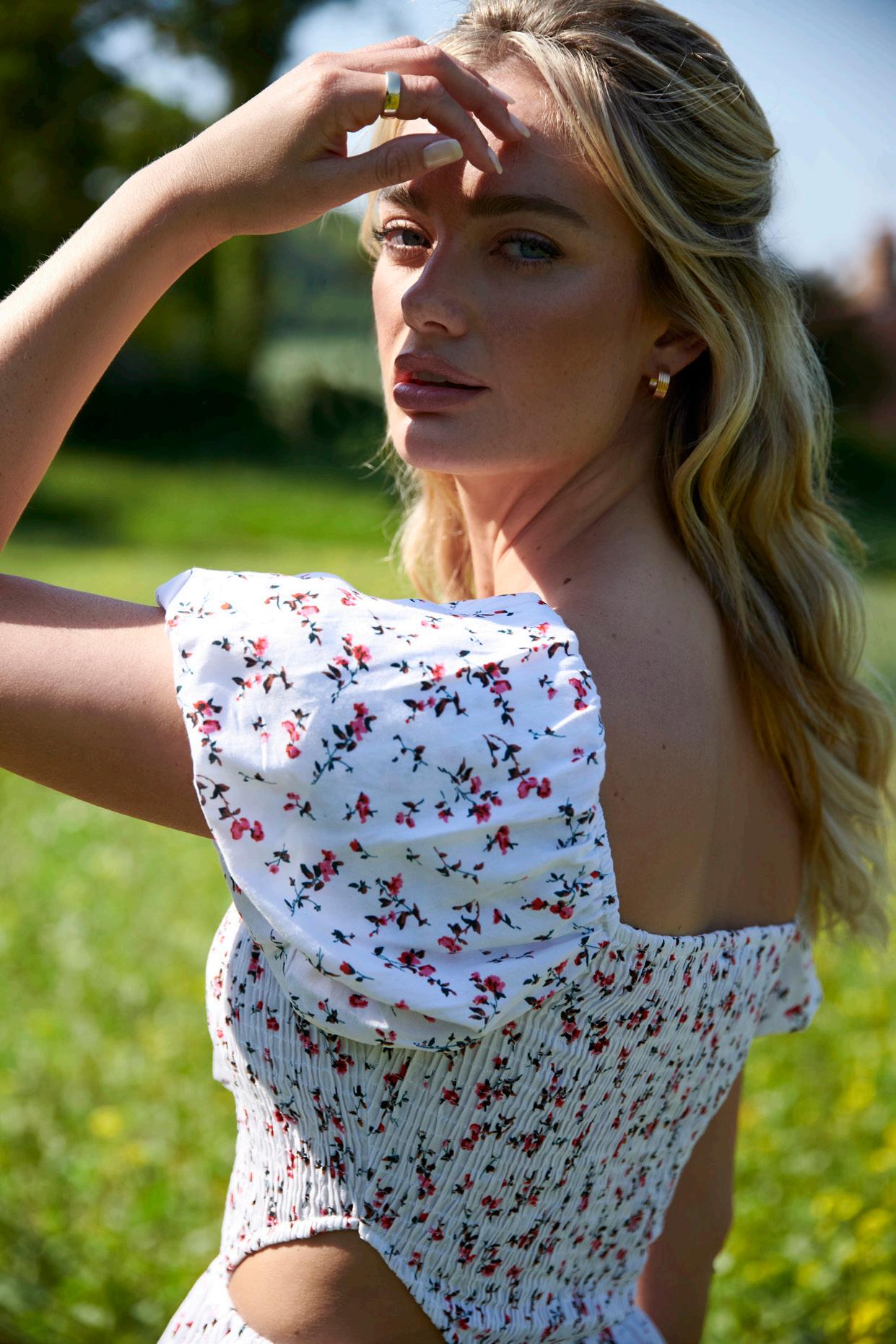

Crochet Zig Zag Top & Shorts PINK VANILLA


Ditsy Floral Frill Tie Top
PINK VANILLA
Detail Puff Sleeve Crop Top
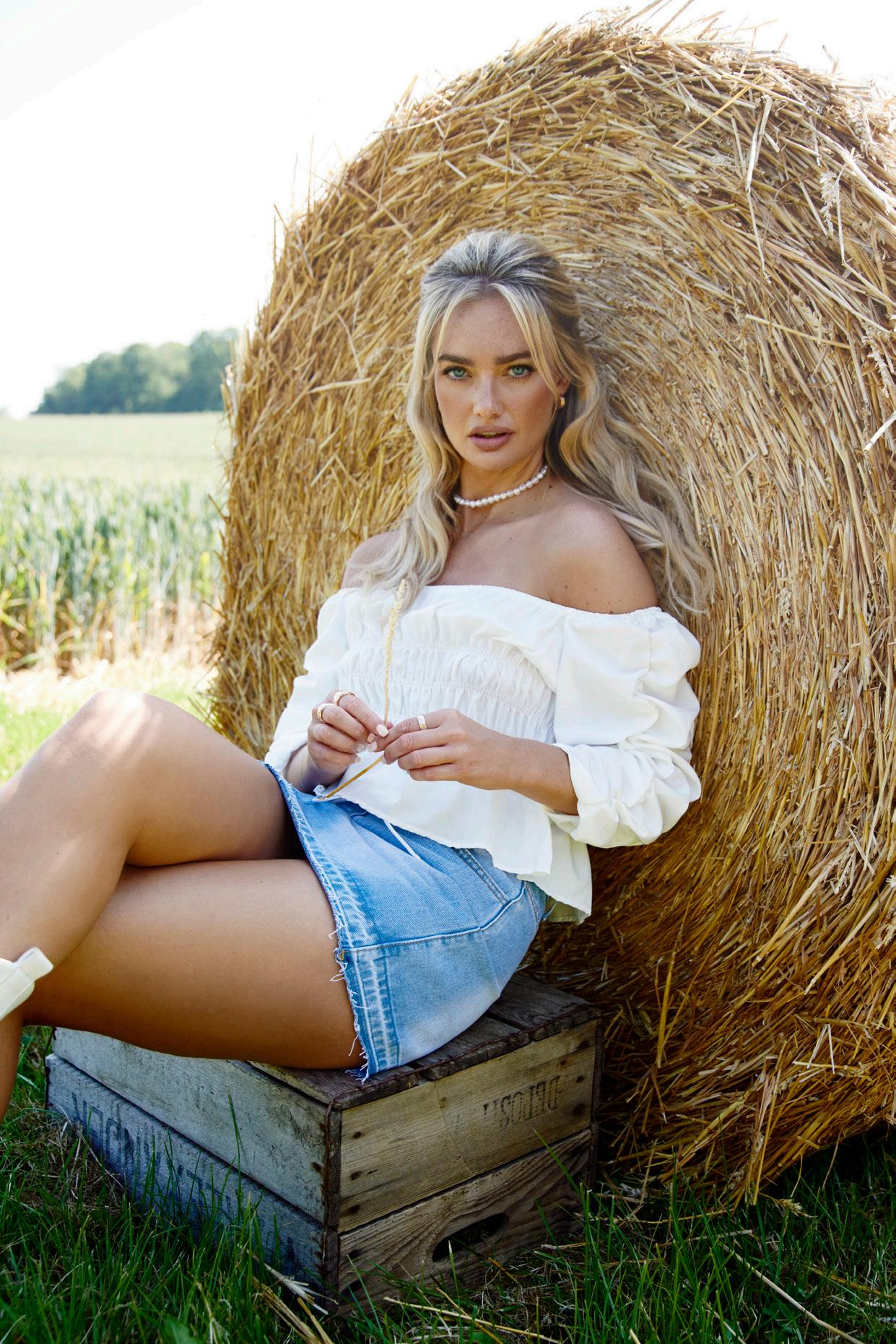
Shirred
PINK VANILLA

Outift MISS CIRCLE

URBAN CHIC
PHOTOGRAPHER: DARIA VALIGURAS @valiguras
MODEL: ELISA BARRANU @elisabarranu
AGENCY: ELITE MODEL MANAGEMENT MIAMI @elitemiami wardrobe provided by THE CONFESSIONAL SHOWROOM NYC @theconfessionalshowroomnyc & MISS CIRCLE @misscircle_newyork

HALEIA


Outift MISS CIRCLE



Dress MISS CIRCLE

Skirt BEAUTE COMME TOI
Top ZARA




Skirt BEAUTE COMME TOI
Top ZARA

FASHION

EMBRACING the VIRTUAL RUNWAY
Visiting the Rise of AI-Generated Models
By JOSE-MARIA JIMENEZ
In an age where technology continuously intersects with every facet of our lives, the fashion industry stands at the forefront of innovation. From revolutionary fabrics to boundary-pushing designs, fashion has always been a reflection of the times we live in. However, the latest addition to the fashion landscape has taken a step beyond the tangible; enter the era of AI-generated models.


Traditionally, the fashion industry has been synonymous with supermodels gracing glossy pages and strutting down runways, embodying beauty standards and aspirational lifestyles. Yet, in recent years, a new wave of models has emerged, ones that don't require hair, makeup, or even a wardrobe change. They exist purely in the digital realm, crafted meticulously by algorithms and computer programming. These AI-generated models are challenging conventions and reshaping the very definition of what it means to be a model.
One cannot deny the allure of these virtual beings. With their flawless features, unattainable proportions, and ability to seamlessly transform into any desired aesthetic, they offer designers a blank canvas upon which to project their creative visions. Freed from the constraints of human limitations, AI models open up a world of possibilities, enabling designers to experiment with radical concepts and push the boundaries of traditional fashion norms. Moreover, the rise of AI-generated models has implications beyond the creative realm. In an industry that has long been criticized for its lack of diversity and inclusivity, virtual models offer a solution. They transcend physical attributes such as race, age, and size, providing a platform for underrepresented voices to be heard and celebrated. In a world where representation matters more than ever, AI models offer a glimpse into a more inclusive future for fashion.




However, as with any technological advancement, the rise of AI-generated models also raises questions and concerns. Some argue that the increasing reliance on virtual models could further perpetuate unrealistic beauty standards, exacerbating issues of body image and self-esteem. Others question the authenticity of these digital beings, arguing that they lack the soul and charisma that human models bring to the runway. In a realm where creativity intertwines with culture, the presence of human models remains an indispensable cornerstone. Fashion, more than mere garments, embodies narratives, emotions, and aspirations. It's through the human form that these stories truly come alive. While AI-generated models boast technological allure, they lack the ineffable essence that human models effortlessly exude. From the graceful stride on the runway to the candid moments captured behind the scenes, human models infuse fashion with authenticity and relatability, forging connections that transcend the digital divide.
The legacy of visionaries like John Casablancas , the luminary behind ELITE modeling agency, underscores the profound impact of human models on the fashion landscape. Casablancas's discerning eye not only launched the careers of iconic figures like Cindy Crawford and Naomi Campbell but also crystallized the concept of the 'supermodel'. These luminaries weren't just faces; they were embodiments of charisma, allure, and individuality. Casablancas understood the irreplaceable allure of human presence in fashion, recognizing that it's not merely about the clothes but the dynamic interaction between cloth and flesh, between imagination and reality. As we honor his legacy, we reaffirm that in the ever-evolving tapestry of fashion, the human model remains an irreplaceable icon of elegance and expression. At QP , we believe in celebrating diversity in all its forms while recognizing the transformative power of technology and its ability to reshape our world, including the world of fashion, but nothing beats the sensations and experiences of a traditional photoshoot with real (human) fashion models.


Pink hoodie SOLELY (GLIMPSE MIAMI) ~ Yellow tiger stripe top SUKI COHEN (GLIMPSE MIAMI) Black patten leather short NINE MINUTES (MODA 39) ~ Visor JMKCOZ ~ Earrings MODA 39 Beaded and yellow rope bracelets GLIMPSE MIAMI Necklaces GLIMPSE MIAMI

COLOR SPLASH
PHOTOGRAPHER: DARIA VALIGURAS @valiguras
MODEL: JESSICA FELTER @jessica_felter agency: ELITE MODEL MANAGEMENT MIAMI @elitemiami
fashion stylist: CRISTINA CELLINI @nobodysugly
makeup artist: BRI SOFFA @brisoffa hair stylist: YULIIA YEFREMENKO @juls.passion


Black bikini bottom GURIA (SHOWROOM 305) ~ Leopard top PE NATION (GLIMPSE MIAMI)
Jacket ROCK N KARMA (THE CONFESSIONAL SHOWROOM MIAMI) ~ Pink plastic bracelets MODA 39
Purse MODA 39 ~ Beaded and yellow roped bracelet GLIMPSE MIAMI
Necklaces GLIMPSE MIAMI ~ Cap MODA 39 ~ Earrings MODA

Black wetsuit AXESEA ~ Swim top under POISSON D’AMOUR (MODA 39)
Necklaces GLIMPSE MIAMI ~ Beaded and yellow roped bracelet GLIMPSE MIAMI
Pink plastic bracelets MODA 39 ~ Earrings MODA 39



Black n white zebra swim SUKI COHEN (GLIMPSE MIAMI) ~ Earrings MODA 39
Red top ROCK N KARMA (THE CONFESSIONAL SHOWROOM MIAMI)
Silver windbreaker
STEFAN FASHION (THE CONFESSIONAL SHOWROOM MIAMI)
Necklaces GLIMPSE MIAMI ~ Bracelets GLIMPSE MIAMI ~ Belt STYLIST´S OWN
Fins CAPAS ~ Mask EVERSPORT ~ Watch CASIO ~ Socks MOVOYEE

Yellow leather hand painted jacket ARDEM (MODA 39)
Animal printed multi colored one piece swimsuit 4GIVENESS (MODA 39)
Neck scarf LAUREL KANYON (GLIMPSE MIAMI) ~ Hand weights BA/A (GLIMPSE MIAMI)
Necklaces GLIMPSE MIAMI ~ Glasses KALIYADI ~ Earrings MODA 39



Jacket ALENKIE (THE CONFESSIONAL SHOWROOM MIAMI)
Shorts KARELLE (GLIMPSE MIAMI)~ Top TIN KERBELL (MODA 39)
Necklaces GLIMPSE MIAMI ~ Yellow watch E_VIBRA ~ Yellow rope n beaded bracelets GLIMPSE MIAMI
Glasses RANTIZON ~ Earrings MODA
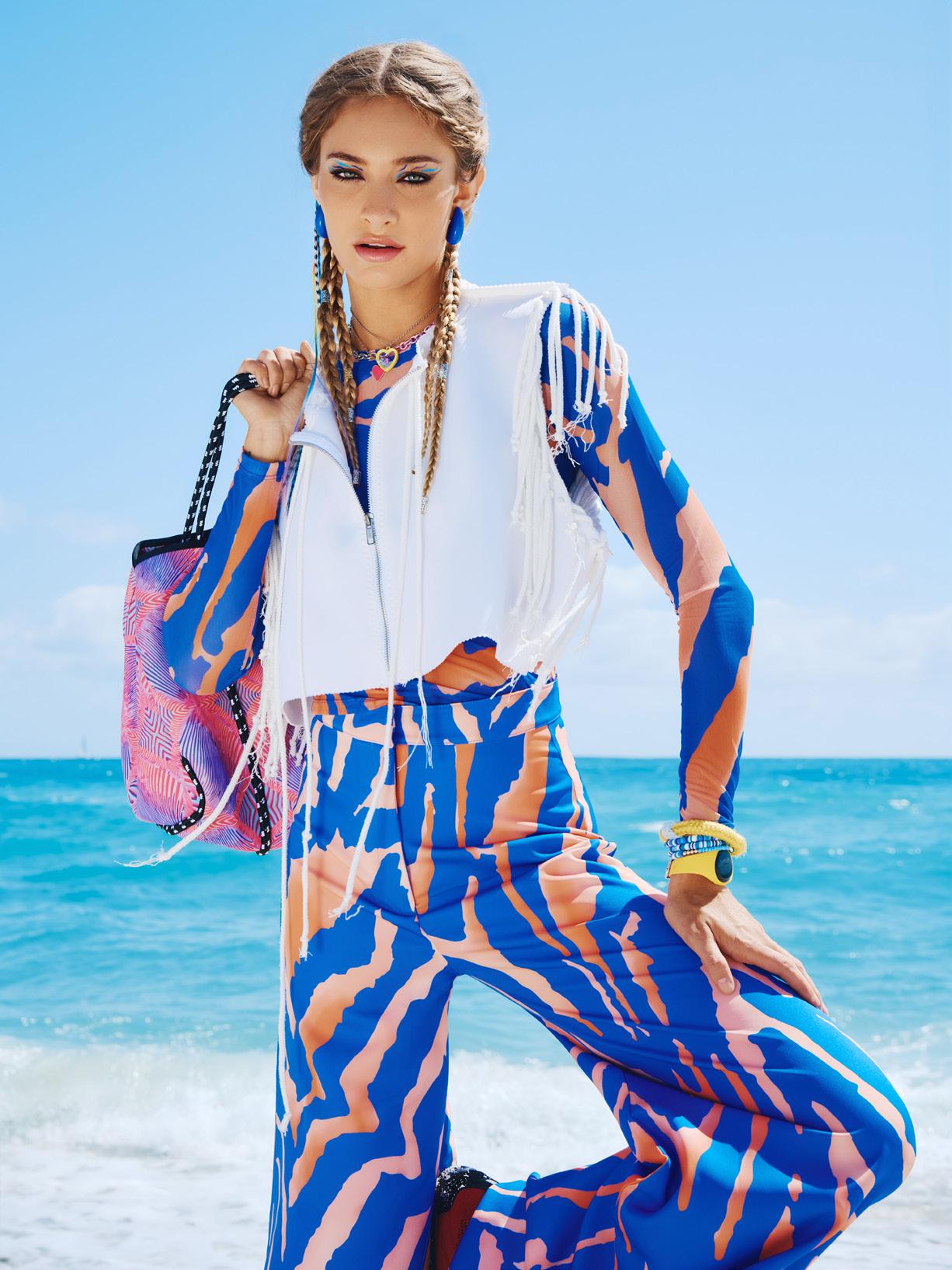
Blue and fluorescent pink pants and top HIPNOS (GLIMPSE MIAMI) ~ Bag GLIMPSE MIAMI
White vest THE CONFESSIONAL SHOWROOM MIAMI ~ Red shoes UBFEN
Yellow watch E_VIBRA ~ Beaded bracelets GLIMPSE MIAMI ~ Earrings MODA 39



Bikini ALAMEA (GLIMPSE MIAMI) ~ Blouse GYPSY SOUL (GLIMPSE MIAMI)
Necklaces GLIMPSE MIAMI ~ Yellow watch E_VIBRA
Beaded bracelets GLIMPSE MIAMI ~ Earrings MODA 39

Bikini ALAMEA (GLIMPSE MIAMI) ~ Blouse GYPSY SOUL (GLIMPSE MIAMI)
Necklaces GLIMPSE MIAMI ~ Yellow watch E_VIBRA
Beaded bracelets GLIMPSE MIAMI ~ Earrings MODA 39

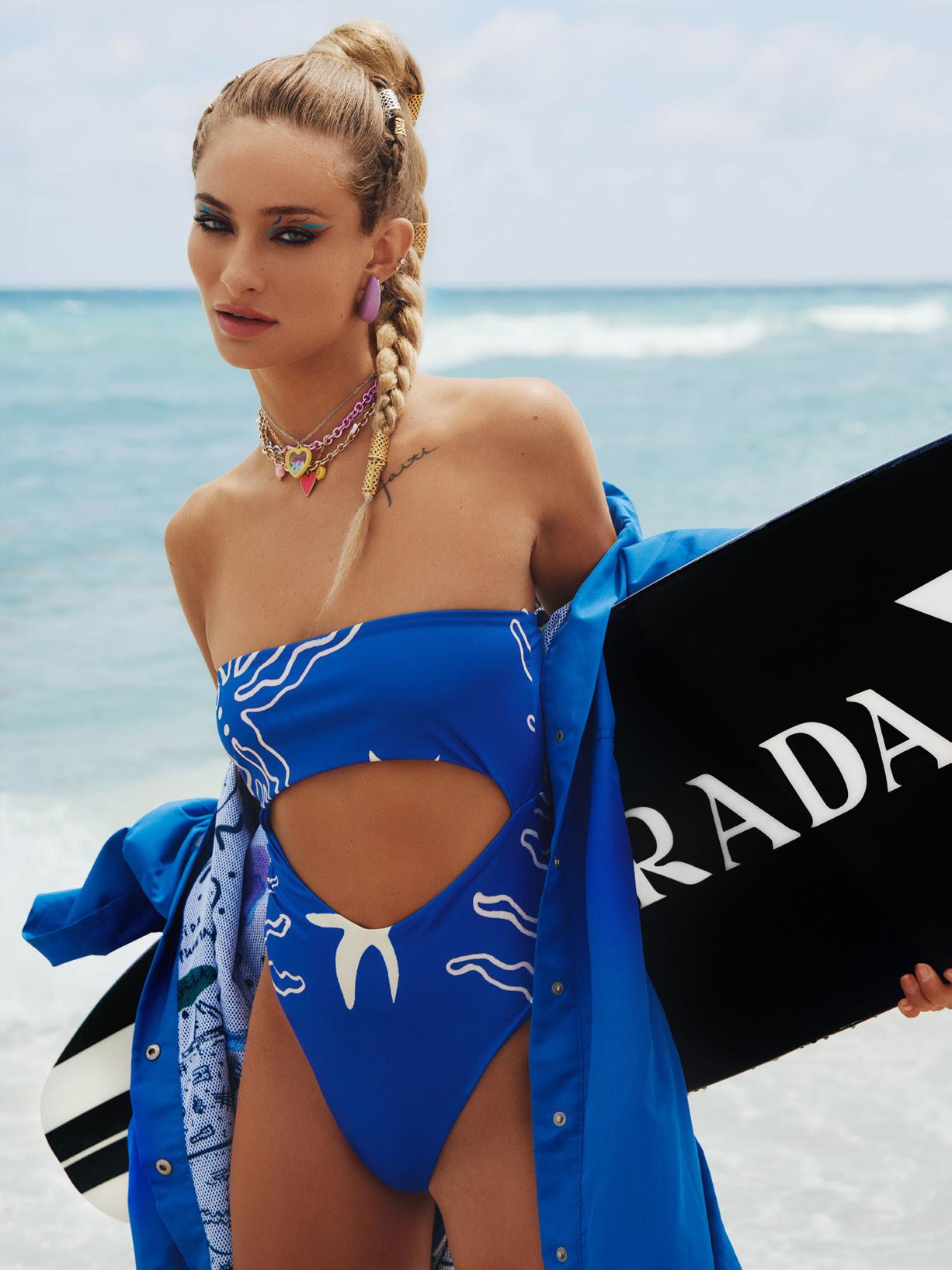
Blue cut out one piece BAHAMA MAMA (GLIMPSE MIAMI) ~ Necklaces GLIMPSE MIAMI
Blue long windbreaker ALENTIE (THE CONFESSIONAL SHOWROOM MIAMI)
Red shoes UBFEN ~ Earrings MODA 39



KRYSTLE LINA CAPTURING BEAUTY
Interview by JOSE-MARIA JIMENEZ
In the world of fashion, where every click of the camera lens tells a story, Krystle Lina stands as a luminary, effortlessly blending elegance, allure, and a keen eye for detail. Renowned for her distinctive style and unparalleled vision, Krystle Lina has carved a niche for herself as a leading fashion photographer, weaving magic behind the lens for iconic brands like GUESS. But her journey into the world of photography is as intriguing as her captivating images.
A former PLAYBOY model turned photographer, Krystle's transition from in front of the camera to behind it is a testament to her multifaceted talent and unwavering passion for the art of visual storytelling. With a portfolio that exudes sophistication and glamour, she brings a unique perspective to every shoot, infusing each frame with her signature blend of grace and allure.
OPPOSITE PAGE: MODEL: KRYSTLE LINA @krystlelina
PHOTOGRAPHER: EKATERINA GORBACHEVA @ekaterinagorbacheva.art cars provided by WORKSHOP5001 @workshop5001


HOLLY MADISON
As a former Playboy model turned photographer for GUESS, your career trajectory is fascinating. Can you walk us through the transition from being in front of the camera to behind it? I never planned to become a photographer. Before modeling, I started out as a makeup artist. But it was during my time in the industry, trying different roles from acting to radio, that I found my true passion lay in photoshoots. I realized I wanted more creative involvement, so I took the leap and bought a camera, lights, and Photoshop to start my journey. While still modeling, I pitched myself to Playboy Radio, landing my own segment as their resident photographer on The Playboy Morning Show. The exposure helped me gain attention online and in the press. I worked with reputable models, shooting almost daily, which accelerated my learning curve. I was fortunate to receive guidance from respected photographers, though most of what I learned was through trial and error.
Now, over a decade later, I'm still growing and learning as an artist. I stay humble, knowing there's always more to learn and grateful for where I am today.
How did your experiences as a model influence your perspective as a photographer, especially in the realm of fashion and beauty?
GUESS specifically, and how do you approach capturing the essence of the brand in your photography?
I've always been drawn to the timeless allure of old Hollywood glamour and vintage black and white photography. Growing up, GUESS was a staple in my wardrobe, and I admired the iconic campaigns for their striking beauty and unforgettable imagery. Being part of such an iconic company is truly an honor, and I never take it for granted. In my photography, I strive to capture the essence of GUESS's classic aesthetic while infusing it with my own personality and style.
In an industry often criticized for its portrayal of women, how do you navigate the balance between celebrating femininity and avoiding objectification in your work?
“I have always been drawn to the timeless allure of old Hollywood glamour”
My background in modeling deeply shapes my perspective as a photographer, especially in fashion and beauty. Years in front of the camera taught me the nuances of posing and expression, helping me guide models with ease. I developed a keen eye for aesthetics and detail, focusing on composition, lighting, and styling to craft compelling images. Understanding the vulnerability of being photographed, I approach shoots with empathy, aiming to capture not just beauty but also personality. This unique blend of experiences allows me to create impactful fashion and beauty photography.
GUESS is renowned for its iconic campaigns and imagery. What drew you to working with
As a woman in the industry, I prioritize portraying women with respect and empowerment in my work. By collaborating closely with my subjects and promoting diversity, I celebrate femininity while challenging traditional stereotypes and promoting positive body image. Collaborating with models who may have similar backgrounds to yours, how do you ensure a comfortable and empowering environment on set?
As a woman and former model myself, I understand the importance of creating a comfortable environment on set. When you're in front of my camera, it's all about you. Ensuring my models feel safe and valued is paramount. I prioritize their comfort and wellbeing, making sure they know their image is respected and cherished.
Your photography often exudes a sense of glamour and sophistication. What are some key elements you focus on to achieve this timeless quality in your images?
I tend to shoot what I like. I’m drawn to highend vintage vibes in my photography—it's just my thing. To bring out that sense of glamour and sophistication, I pay attention to styling, lighting, and the little details. It's all about capturing that timeless allure with a modern twist.

NADIA MEJIA
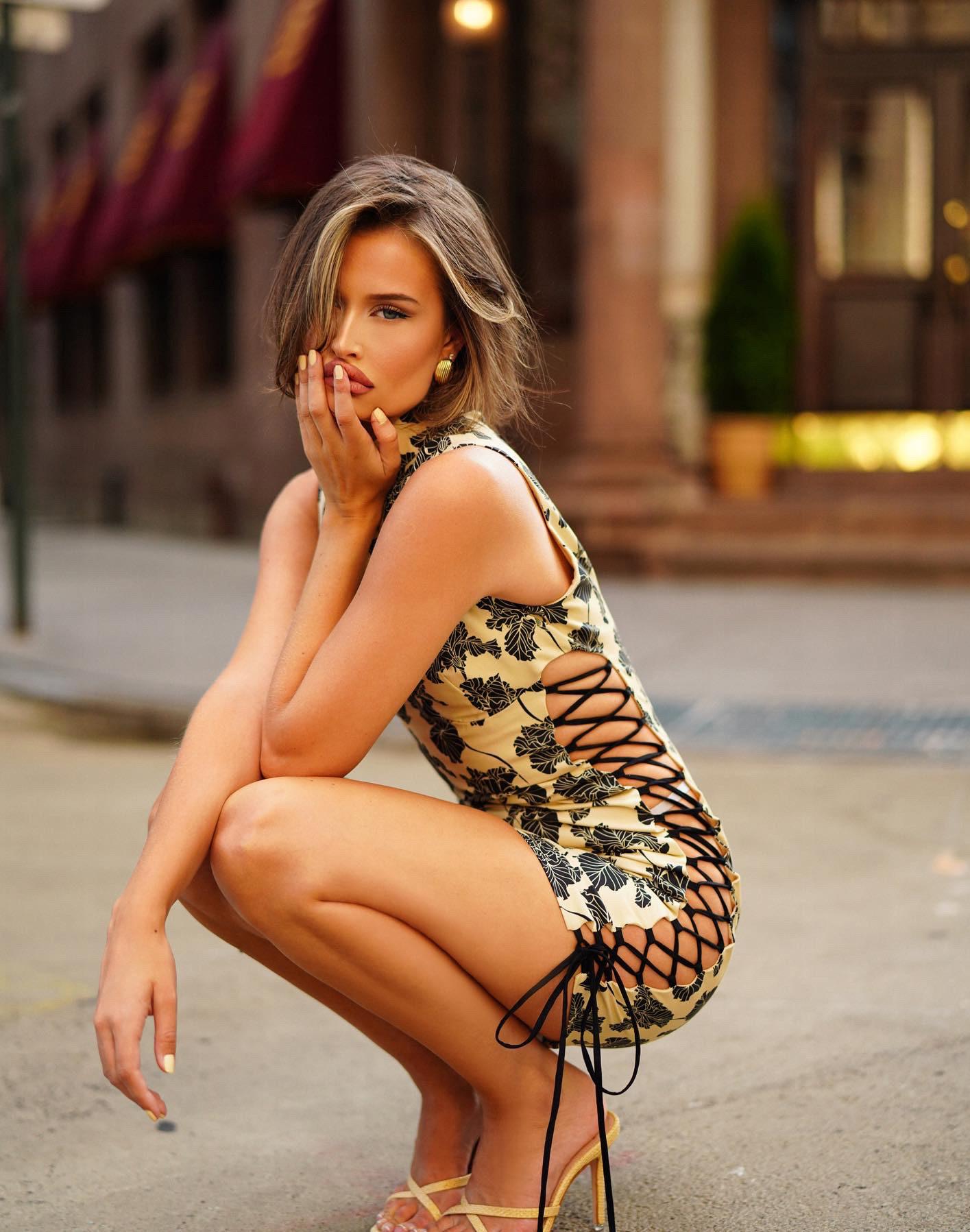
LEXI WOOD
With the rise of social media and influencer culture, how do you think the landscape of fashion photography has evolved, and how do you stay innovative in such a dynamic industry?
The emergence of social media and influencer culture has significantly transformed the landscape of fashion photography, expanding beyond traditional magazine spreads. There's now a demand for authentic, relatable content that resonates with online audiences, leading to more diverse and inclusive representations of beauty and fashion. To stay innovative in this dynamic industry, I prioritize staying informed about emerging trends and technologies, while also collaborating with influencers, brands, and other creatives to explore new ideas and push boundaries.
Your portfolio includes a diverse range of projects, from high fashion editorials to celebrity portraits. How do you maintain versatility while still maintaining your signature style?
I think versatility keeps my work exciting across different projects, from fashion to celebrity portraits. While each project brings its own vibe, I always bring my unique style into the mix. It's about staying true to my creative vision while being open to new ideas and styles. It keeps things fresh and authentic, allowing me to explore new territories while still staying true to myself.
Fashion photography often involves collaboration with stylists, makeup artists, and other creatives. How do you approach teamwork and ensure everyone's vision aligns to create a cohesive final product?
In fashion photography, teamwork is crucial. I ensure everyone's vision aligns by fostering open communication and mutual respect. Before the shoot, we discuss the concept and objectives together. During the shoot, I
encourage ongoing dialogue and feedback to achieve our shared goal of creating a cohesive final product.
As a photographer, what do you find most challenging when working on large-scale campaigns or high-profile projects, and how do you overcome these challenges?
Handling large-scale campaigns or highprofile projects can be intense, especially with tight deadlines and client expectations. I tackle this by planning meticulously, communicating effectively with my team, and staying flexible when unexpected challenges arise. I've learned to stay calm and adapt under pressure, focusing on finding solutions. This approach ensures that I deliver exceptional results while navigating the complexities of these projects with confidence.
The fashion industry is increasingly conscious of sustainability and ethical practices. How do you incorporate these values into your work as a photographer?
I prioritize sustainability and ethical practices in my work by minimizing waste, using digital formats when possible, and opting for sustainable materials. I also collaborate with brands that share these values, aiming to reduce environmental impact and promote responsible consumption.
One last question, how do you feel about the use of AI-generated models in the fashion industry?
The use of AI-generated models in the fashion industry brings both opportunities and challenges. On one hand, it offers greater flexibility, diversity, and potentially lower costs for brands. However, it also raises questions about authenticity, ethical implications, and the impact on traditional modeling careers. It’s a topic that requires careful consideration of both the benefits and potential drawbacks.
“The use of AI-generated models in the fashion industry raises questions about authenticity, ethical implications, and the impact on traditional modeling careers”



RADIANCE
PHOTOGRAPHER: YASMINE KATEB @yasminekateb
MODEL: LEILA BAUER @leila agency: THE INDUSTRY MODEL MGMT LA @theindustryla FASHION stylist: DREA CELESTE @drea.bydesign makeup artist: ARCHANGELA CHELSEA @archangelachelsea hair stylist: PARISA ZOHRABI @parisaloveshair














SHOPPING GUIDE
3 ways to STYLE short SHORTS
By OLIVIA CRUTCHLEY @styledbyliv__
From micro shorts to short shorts to hot pants, the nopant trend is set to sizzle throughout the summer months, whether you're ready or not. Here, we give you three ways to style a single pair of shorts, giving you some inspiration for embracing this bold fashion movement…
SUPER STYLISH
Elevate your look with a coordinated black leather blazer, complemented by over-the-knee pop socks for a touch of leg allure. Complete the ensemble with sleek court heels and sparkling silver jewellery for a sophisticated sexy vibe. Layer a crisp white shirt underneath the blazer for an added timeless stylish finish.





BACK TO
For those days priority, opt for shorts with a plain into your favourite ensemble, perfect
TRÉS TRÉS CHIC
Choose effortless everyday elegance by pairing with tonal knitwear and ballet flats, creating this ballet-core ensemble, perfect for leisurely shopping days, combining comfort with style for a polished yet relaxed vibe.





TO BASICS
when comfort is key but style is still a for a simple yet chic approach. Pair your plain tee, add a structured blazer, and slip favourite comfy trainers for a stylish yet practical perfect for tackling errands with ease.


ISABEL MARANT $1,720
Knit cardigan ZARA $44.50
Tote bag ALL SAINTS $196.50
Ballet flats DUNE $99
ELEGANT RIDE
PHOTOGRAPHER: KRYSTLE LINA @krystlelina
MODEL: CHRISTEN DYE @christenash hair and makeup: BESA K. @makeupbybesa_k
ASSISTANT: GRAHAM @gramsnacks
CARS PROVIDED BY THE CULTIVATED COLLECTOR @thecultivatedcollector

Dress STATNAIA









MAJESTIC MUSE
PHOTOGRAPHER: MÉGANE CLAIRE @meganeclaire
MODEL: TRICIA ROSE @triciaroseee
fashion stylist: MÉGANE CLAIRE @meganeclaire
makeup artist: MARYLIN NUZZO @makeupby.marylin
HAIR STYLIST: MÉGANE CLAIRE @meganeclaire





MAGPIES & PEACOCKS REDEFINING FASHION'S FUTURE
Interview by QP STAFF WRITER
In a world where fashion often seems synonymous with excess and waste, a beacon of hope emerges in the form of MAGPIES AND PEACOCKS. This revolutionary nonprofit design house stands at the forefront of a movement dedicated to transforming the industry's approach to sustainability and social responsibility.
Founded by a dynamic duo with a vision as bold as it is altruistic, Magpies and Peacocks has become the nation's pioneering force in repurposing post-consumer clothing, scrap textiles, and accessories. Their mission? To disrupt the wasteful cycle that plagues the fashion landscape, while simultaneously addressing the profound environmental and social repercussions it engenders.
We had the privilege of sitting down with the visionary founders behind this remarkable initiative. Join me as we delve into their inspiring journey, innovative practices, and unwavering commitment to reshaping the future of fashion—one recycled thread at a time.

AHSHIA BERRY & SARAH-JAYNE SMITH FOUNDERS OF MAGPIES & PEACOCKS

Can you provide us with an overview of Magpies & Peacocks' mission and how the company is making a difference in the fashion industry's sustainability landscape?
Magpies & Peacocks is the nation’s only 501(c)3 non-profit design house dedicated to the collection and sustainable reuse of post-consumer clothing, scrap textiles and accessories diverted from landfill – in order to disrupt the cycle of waste in the fashion industry and mitigate its enormous environmental and social impact. We work with an in-house team of designers, makers and artists to create unique up-cycled products, offer skill building and sustainability education, and incubate circular fashion innovation. Our model rests on four pillars: Collaborate, Create, Educate and Invest.
We strive to make a difference in the fashion industry with:
1. Resource conservation - reclaim reuse upcycle repair - circularity
2. Lower carbon footprint - curbing consumption, transportation, chemical use
3. Conservation - water, trees, petrochemicals
4. Mitigation - toxic production, chemicals, pollution, ethical treatment of workers
How does this structure support your sustainability goals?
It is a long road ahead to fix a systemic industry so riddled with environmental and social issues, but it can be done if we educate people on the ramifications of textile waste, the value of conscious consumption, and provide them with the creative knowledge and tools to be part of the solution. In direct response to Sustainable Development Goals 4, 5, 8 10,12, 14 & 15 - education, equality, fair wages and conditions, responsible consumption and production, and the ultimate regard for people and planet before profit, are all pillars of our ongoing mission.
The concept of upcycling is at the heart of your organization. How do you source post-consumer clothing and textiles, and what creative processes are involved in transforming these materials into unique products?
“It is a long road ahead to fix a systemic industry”
5. Waste reduction - diverting from landfill, extending lifespan
6. Building eco systems - regenerating the industry that is kinder to people and planet
Could you elaborate on the significance of being a 501(c)3 non-profit design house?
Tax deductible and gluten free was one of our original tag lines! When we started the organization 13 years ago we were looking for ways to engage the community without the weight and burden of all of the negative information about the industry. The non profit business model allows us to present an easy way for people to participate and it really caught on that by donating their post consumer textiles they could also receive a tax deduction, this is also a major benefit to big brands that donate to us and grantors that support our mission.
We have honed a unique non profit business model to facilitate diverting a targeted pollutant material from the waste stream; established how to work with city officials, sports authorities, convention districts, hotels, parks, event companies and colleges, alongside businesses and the community to keep that material out of landfill; and turned that material into a platform for manufacturing, quality employment and training - all of which could be applied to any city to improve their sustainability goals and meet the needs of their community. It is our long term goal to be able to effect change at scale with this model. The process of reworking that material has grown exponentially too - we employ zero waste techniques where possible (using the entirety of the piece we’re upcycling) as well as developing innovate techniques to working with nonconventional materials. Often it is the material that determines the end product so the team is always brainstorming the approach to a solution.
Magpies & Peacocks focuses on disrupting the cycle of waste in the fashion industry. How do you see your efforts contributing to reducing the industry's environmental impact on a broader scale?
Magpies & Peacocks has worked in environmental arts for 12 years – addressing
the systemic social and environmental issues within the fashion and textiles industries. The demand for our service for textile recycling has grown exponentially, with intake from the community doubling, and from local businesses tripling in the last year alone. Support from local and national organizations that align themselves to community has meant we can steadily raise our capacity to meet that demand, while building a space for learning, creating, growing and gathering in the heart of an under-served neighborhood.
To date we have diverted 195+ tons of textile waste from landfill. We have transformed that waste material into over 12,000 up-cycled products and turned our production process into a training ground for over 45 members of the community including adding workforce experience tracks and apprenticeships for community college students/graduates. With $100 billion of usable textiles lost to landfill every year, human rights atrocities ruling the global fashion industry and an increasing available local workforce – it has never felt more relevant than to present economic opportunities to the underserved unemployed here in the US. Every small step in that journey has impact so we are constantly trying to leverage that progress!
Collaboration seems to be a key pillar of your organization. Could you share some examples of successful collaborations that have resulted in innovative upcycled products?
We are currently partnering with Southwest Airlines as part of their Repurpose with Purpose program, creating clothing collections and small goods upcycled form the aircraft leather. in addition to runway looks we are working on exhibits for airports as well as custom pieces for their executives. We are also partners with
Houston’s convention center which means we have a steady stream of banners and left over textiles from them, and have created many hundreds of products for Houston First (the city of Houston’s marketing arm) for VIP sporting events from material from the NFL, Rodeo, Women’s March, as wells our theater district and sports authority!
Your commitment to education is evident. How do you incorporate sustainability education into your initiatives, and what role does it play in promoting conscious consumer choices? and 14. What kind of skill-building opportunities do you offer to emerging designers, makers, and artists who are passionate.
In direct contrast to the global fashion industry and its demand for cheap and trafficked labor, we have an intentional approach to creating workforce pipelines, advancing inclusive entrepreneurship and building a framework for advancing racial, economic and social equity. It is essential that we center that equity to create a stronger more representative workforce pipeline for our community, and after decades of economic trends that wiped out local manufacturing, that we finally harness the opportunity to create a more ethical, sustainable, diverse and inclusive future for the industry.
Our products are a vehicle for our message so it is essential that each piece carry with it an origin, our process and the importance of their decision to purchase it! It is a shared responsibility and a shared benefit to do right by people and planet.
Magpies & Peacocks has over the last two years drilled down on our MAKR Collective training program, realizing that quality not quantity results in higher impact – tailoring our tracks to accommodate the growth of an individual
“we have an intentional approach to creating workforce pipelines, advancing inclusive entrepreneurship and building a framework for advancing racial, economic and social equity”


to effect real change in their lives. Whether we are teaching a woman to sew to make clothes for her family, helping to build a small business for an underserved entrepreneur looking to redefine her own destiny, or employing someone to advance them to professional level with us – we are interested in redirecting the narrative for our survivors and trainees – establishing new stories, passions and opportunities for them, and most importantly building on their personal empowerment to act on them. Maker spaces, such as ours, inherently foster creative innovation, and we do so at a skill by skill level - meeting the demand for community-embedded urban manufacturing and other needs head on. This holistic approach to workforce opportunity means that we are able to tailor skills to the local demand in real time. We currently have tracks in sewing, warehouse management, retail and café.
94% of our MAKR Collective trainee participants are of color, all have multiple social vulnerabilities and are aged between 24-50yrs. Most clients identify as female or from the LGBTQIA+ communities. All were living below the poverty line. We have trained survivors of human trafficking, domestic violence and housing insecurities and are soon to be working with veterans and opening our doors to the community for workshops. Our current team is made up from people from all walks of life.
a closed-loop system, reducing waste and maximizing the lifespan of clothing and textiles. This is effectively the dictionary definitionand with that goes the need to pivot from one material to another, from one technique to another and to find the highest and best use of each material. Most graduating designers are not used to working that way, so there is a definitely a learning curve to that! Pretty much everything we make is a limited edition or small batch piece that doesn’t start with a conventional pattern and the material will often dictate the product and technique. As a team we are constantly learning from each other and from our materials.
“Creating a conscious consumer is the job of every organization in the sustainability sector”
Circular fashion innovation is an intriguing aspect of your model. Can you give us insights into how you nurture and support such innovation within your organization? and 8. In-house design teams often work with a wide array of materials. How do your designers approach the challenge of working with diverse textiles to create cohesive and visually appealing products?
Circular fashion refers to an approach within the fashion industry that aims to create
Sustainability is now a buzzword in the fashion industry. How do you ensure that the products created by Magpies & Peacocks align with both ethical and aesthetic standards?
Sustainability is certainly a buzzword but the fashion industry hides behind many trends to keep the state of systemically ugly 1.7 billion dollar industry from view. Most of what appears to be sustainability is in fact marketing, resulting in a massive swathe of greenwashing that influences the consumer purchase. Creating a conscious consumer is the job of every organization in the sustainability sector and we take that job very seriously!
Ethics and aesthetics should never be mutually exclusive - good design is good design and just because a production team are paid a living wage and the material is sourced responsibly that should never be up for question. There has always been a trope about the ‘crafty’ aspect of upcycling as if it less than fashion, but transversely that sustainable fashion is expensive. The truth is that all fashion should be ethical and sustainable and anyone who thinks otherwise is happy with the appalling statistics of an exploitative industry that represents one of the planets worst polluters.
The fashion world is often associated with fast-paced trends. How do you balance the need for staying relevant with your long-term vision of sustainable, timeless fashion?
Fast fashion was born out of the globalization of the industry and with that came ways of hiding poor practices, pollution and depletion of resources. It was designed to herd consumers into thinking that clothing quickly becomes out-dated and designing multiple collections seasonally created the necessary volume of sales needed to accommodate the high yield production system synonymous with this exploitative labor model. Slow fashion addresses that in its entirety not just because it is right but because it is necessary - re-shoring production, creating jobs and a consciously sourced supply chain. Long-term fashion will have to compete in this arena to stay transparent and accountable. Staying relevant is about doing what is required above and beyond the call of duty, while still delivering exceptional design. It is the responsibility of all design houses to lead and not follow trends. Could you provide examples of the social impact your organization has had within local communities? How do your efforts extend beyond environmental conservation?
As as organization we measure our success in many different ways, but our impact is always measured from the perspective of People, Planet, Purpose and Profit. Through an Environmental lens - success for us is measured by the tons of textiles we can divert from landfill and up-cycle; Though a Social lens - how many lives we can reach and impact through our programming, focusing on small classes to maximize quality over quantity learning; Through an Arts and Culture lens - how many students, designers, artists and makers can we educate, engage, collaborate and work with as a creative hub, and; Through an
Economic lens - how do our products succeed as a vehicle for our message of sustainability and what support have we been able to garner for the work that we do in the community.
Magpies & Peacocks is a proud committee member for The Urban Manufacturing Alliance (UMA) – a national coalition of manufacturing practitioners working together to grow more equitable and prosperous economies by building robust, sustainable, and inclusive urban manufacturing sectors. We are also part of the 2023 international NEST Artisan Accelerator – supporting the responsible growth and creative engagement of the artisan & maker economy to build a world of greater gender equity and economic inclusion, bringing radical transparency and opportunity to the informal hand-worker economy. Additionally we are active advisory board members of Houston Community College, and MendIt App and GAP Inc are our partners in training for our Alternations and Repairs track. Magpies & Peacocks were named Gucci Changemakers in 2021 (Gucci team members now serve on our advisory board) and we one of two spotlight brands that Afterpay choose as their environmental non-profits during Earth Month.
Magpies & Peacocks has four core pillars: Collaborate, Create, Educate, and Invest. How do these pillars work together to achieve your overarching goals?
Collaborate: Connecting local businesses, artists, designers, and educators
Create: Producing up-cycled high quality, socially responsible products and solutions
Educate: Providing training, and sustainability mentorship
Invest: Supporting under served community workforce development
“Fast fashion was born out of the globalization of the industry and with that came ways of hiding poor practices, pollution and depletion of resources ”
Our Vision and Values
Through collaboration we can:
• Build a sustainable future for local makers & designers
• Promote social responsibility, ethics and circular innovation
• Raise essential funding for creative community development
Non-profit organizations often face unique challenges. How do you navigate the business side of things while maintaining your focus on sustainability and social impact?
Balancing a non profit model with design house practices has certainly been a challenge. Creating multiple income streams has been essential for survival on a nonprofit budget but more importantly creating a manual for how to work with your city, schools, businesses, sports teams, theaters, conventions and your community has been essential in being replicable and scaleable. In truth it has been
a 12 year struggle to get where we are today and it will be a struggle to get where we will be tomorrow, but the journey is as important as the arrival and in order to have impact you have to be in it for the long run. We are so grateful for all the support we’ve received, the opportunities we have ahead of us and hope that social responsibility continues to drive forward-thinking industries to champion circular innovation!
Looking ahead, what are your aspirations for the future of Magpies & Peacocks? How do you envision your organization's role in shaping the future of the fashion industry?
Replicable
Scalable
National & international
Funded by the city/state
Fully integrated
Leading by example and collaborative



KILLER EYES
PHOTOGRAPHER: KENT AVERY @kentaveryphoto
MODEL: LAUREN GONZALEZ @laurengonzalez
AGENCY: GENETICS MODEL MANAGEMENT @geneticsmgmt hair and makeup: EDGAR SAENZ @edgarsaenz7



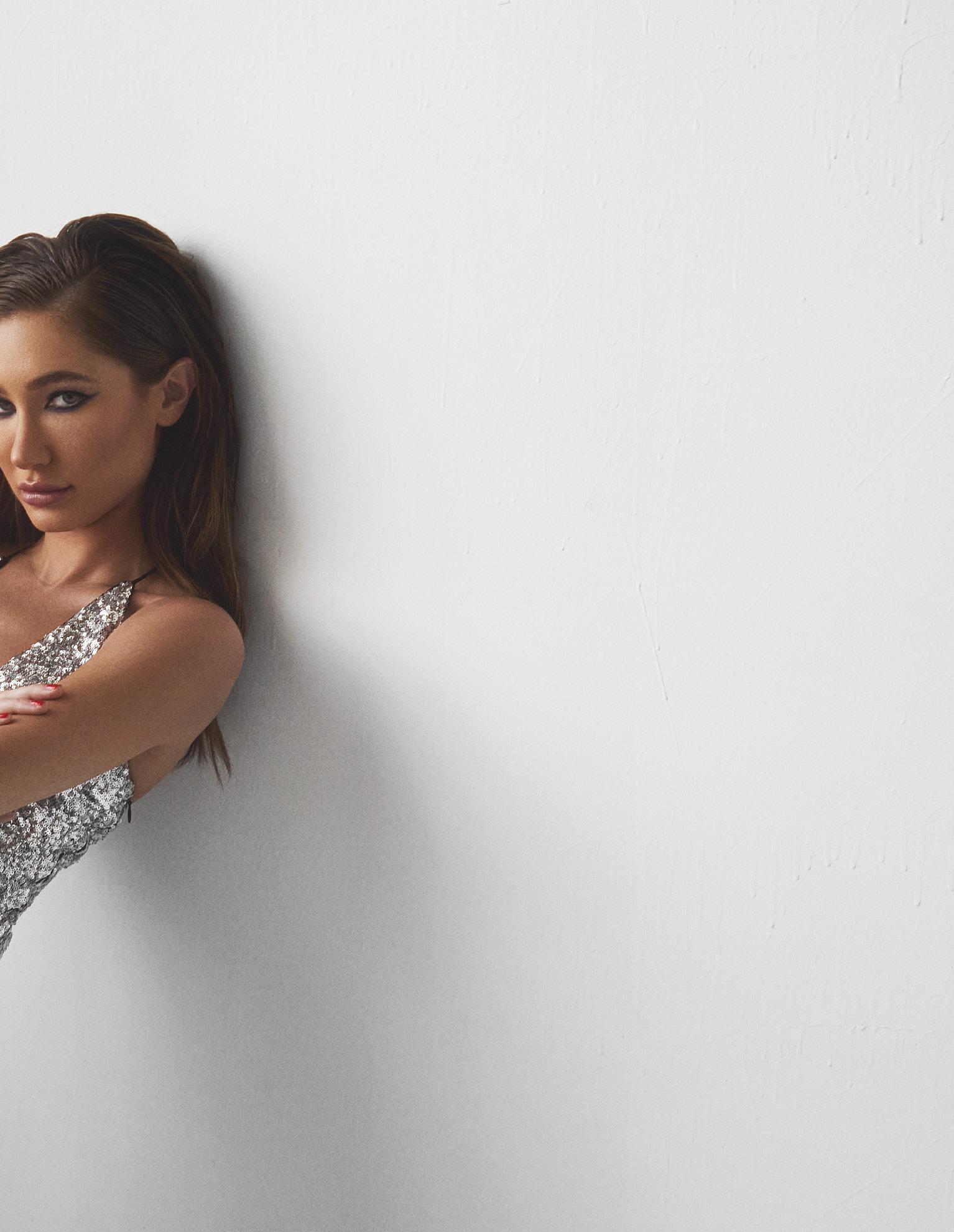










LEILA BAUER
BY YASMINE KATEB



